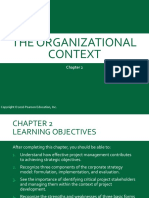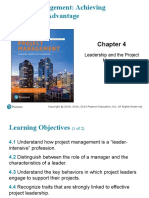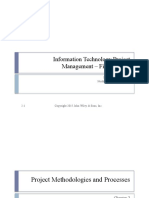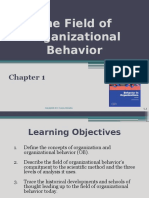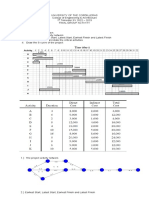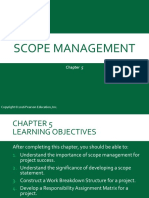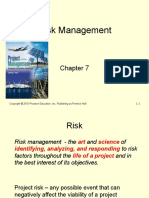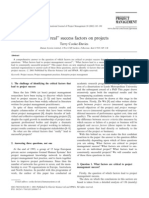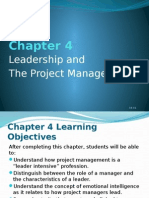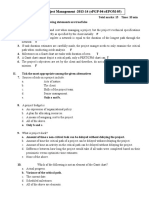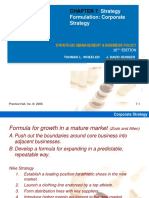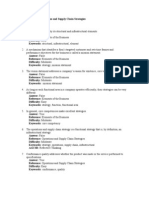MGMT E 5030 Project Management 25804 Jan Spring 2020
MGMT E 5030 Project Management 25804 Jan Spring 2020
Uploaded by
MohammadCopyright:
Available Formats
MGMT E 5030 Project Management 25804 Jan Spring 2020
MGMT E 5030 Project Management 25804 Jan Spring 2020
Uploaded by
MohammadOriginal Title
Copyright
Available Formats
Share this document
Did you find this document useful?
Is this content inappropriate?
Copyright:
Available Formats
MGMT E 5030 Project Management 25804 Jan Spring 2020
MGMT E 5030 Project Management 25804 Jan Spring 2020
Uploaded by
MohammadCopyright:
Available Formats
MGMT E-5030: Project Management (25804, Jan/Spring 2020)
Course Overview and Contact Information
Course Overview
Semester and Year: Spring 2020
Day/Times: Mondays, 7:40-9:40 pm eastern
Format: Online (live) web conference via Zoom
Instructor Contact Information
Name: Dr. Eric Pool, PMP®, ITIL, CSM
Virtual office hours: Mondays, 7:10-7:40 pm eastern (also available by appointment)
Phone: 1-507-269-5734
Email: eric_pool@fas.harvard.edu
*I will respond to email within 24 hours, Monday through Friday
Course Description and Learning Objectives
This course guides students through the fundamental project management concepts, practices,
and behavioral characteristics needed to successfully launch, lead, and realize benefits from
projects in profit and nonprofit organizations. Effective project managers possess the skills
necessary to manage teams, schedules, risks, budgets, scope, and stakeholders to produce a
desired outcome. Students analyze the impact of organizational change management theory and
explore project management with a practical, hands-on approach through case studies, team
assignments, and individual contributions. A key and often overlooked challenge for project
managers is the ability to manage without direct influence, gaining the support of stakeholders
and access to resources not directly under their control. Special attention is given to critical
success factors required to overcoming resistance to change. The course simulates a project in its
project team framework, group accountability, and schedule deadlines.
Course Materials
Course Materials
Required Reading
o Project Management Institute. (2017). A guide to the project management body of
knowledge (PMBOK guide) 6th Edition. Newtown Square, Pa: Project
Management Institute.
o Schwaber, K. & Sutherland, J. (2017) The Scrum Guide [online], via
https://www.scrumguides.org/docs/scrumguide/v2017/2017-Scrum-Guide-
US.pdf#zoom=100
Recommended Reading
Course - MGMT E-5030: Project Management Page 1 of 4
o Kolb, D. M., Williams, J., & Kolb, D. M. (2003). Everyday negotiation:
Navigating the hidden agendas in bargaining. San Francisco, CA: Jossey-Bass.
o Pool, E. T., Poole, K., Upjohn, D., Hernandez, J. (2019). Agile Project
Management Proves Effective, Efficient for Mayo Clinic. Physician Leadership
Journal. https://www.physicianleaders.org/news/agile-project-management-
proves-effective-efficient-mayo-clinic
o Pool, Eric Thomas, "Collaboration of Organization Development and Project
Management" (2017). Education Doctoral Dissertations in Organization
Development. 58. https://ir.stthomas.edu/caps_ed_orgdev_docdiss/58
o Schein, E. H. (1999). Process consultation revisited: Building the helping
relationship. Reading, Mass: Addison-Wesley.
This course meets via live web conference. Students must attend and participate at the scheduled
meeting time.
Grading
Grading
0% Skills check
25% Class Participation
50% Assignments (3 papers and 2 project plans, 10% each)
25% Assignment (1 group project)
Requirements for students taking this course for graduate credit (these two items are pass/fail
with a score of 80% or higher on both receiving graduate credit):
30 question exam (open book)
Research paper covering one of the topics below (1000 words max.)
o Describe how to integrate Organization Development and Project Management
methods.
o Describe the proper use of agile and waterfall methods.
o Describe why projects are failing at alarming rates regardless of the focus on
strong project management practices.
A = 90-100%
B = 80-89%
C = 70-79%
D = 60-69%
F = 0-59%
Course - MGMT E-5030: Project Management Page 2 of 4
All papers are required to use Harvard referencing format. Late assignments will receive a 5%
penalty per day late.
Expectations and Policies
Attendance
It is a requirement to attend and fully participate in each online class and any group sessions
identified throughout the course. Learning from each other is a key component of this
course.
Accessibility
The Extension School is committed to providing an accessible academic community. The
Accessibility Office offers a variety of accommodations and services to students with
documented disabilities. Please visit https://www.extension.harvard.edu/resources-
policies/resources/disability-services-accessibility for more information.
Academic Integrity/Honesty
You are responsible for understanding Harvard Extension School policies on academic
integrity (https://www.extension.harvard.edu/resources-policies/student-conduct/academic-
integrity) and how to use sources responsibly. Not knowing the rules, misunderstanding the
rules, running out of time, submitting the wrong draft, or being overwhelmed with multiple
demands are not acceptable excuses. There are no excuses for failure to uphold academic
integrity. To support your learning about academic citation rules, please visit the Harvard
Extension School Tips to Avoid Plagiarism (https://www.extension.harvard.edu/resources-
policies/resources/tips-avoid-plagiarism), where you'll find links to the Harvard Guide to
Using Sources and two free online 15-minute tutorials to test your knowledge of academic
citation policy. The tutorials are anonymous open-learning tools.
Course Outline and Schedule
Date
01/06 Orientation and Introduction to Project Management
Due: Skills Check - ungraded essay (400 words max.) describing a work, or school,
assignment where you spent more than one week to complete
01/13 Brief History of Project Management
Due: Chapter 1 of PMBOK
01/20 Martin Luther King, Jr. Day: no class
01/27 Environments & Governance
Due: Chapter 2 of PMBOK
Due: Case study on one of your favorite projects (800 words max.)
2/03 Project Managers
Due: Chapter 3 of PMBOK
Course - MGMT E-5030: Project Management Page 3 of 4
Due: Biography on a project manager you admire (800 words max.)
02/10 Waterfall
Due: Chapter 4 of PMBOK
02/17 Presidents’ Day: no class
03/02 Waterfall Cont.
Due: Chapter 5, 6, & 7 of PMBOK
Due: Waterfall project plan in MS Project or Smartsheet
03/09 Agile (Scrum)
Due: The Scrum Guide
03/16 Spring vacation: no class
03/23 Project/Program/Portfolio
Due: Chapter 8 of PMBOK
Due: Create an Agile project plan in Trello
03/30 Project/Program/Portfolio Cont.
Due: Chapter 11 of PMBOK
04/06 Project/Program/Portfolio Cont.
Due: Chapter 12 of PMBOK
Due: Outline the relationship between project, program, and portfolio management (800
words max.)
04/13 Organization Development, Change Management, & Teams
Due: Chapter 9 of PMBOK
04/20 Organization Development, Change Management, & Teams Cont.
Due: Chapter 10 & 13 of PMBOK
Due: Team (4-6 people each) assignment. Write about the relationships between
Organization Development, Change Management, and Project Management (2000 words
max.). Present your findings to the class.
04/27 Class Closing
Due: Graduate Course Credit - 30 question exam (open book)
Due: Graduate Course Credit - Research paper covering one of the topics below (1000
words max.)
Describe how to integrate Organization Development and Project Management
methods.
Describe the proper use of agile and waterfall methods.
Describe why projects are failing at alarming rates regardless of the focus on
strong project management practices.
Course - MGMT E-5030: Project Management Page 4 of 4
You might also like
- PMAN635 Course OverviewDocument10 pagesPMAN635 Course OverviewDerrick Antonio GardnerNo ratings yet
- AUSTRIA DIV JOB ST SGB 2020 Signed PDFDocument7 pagesAUSTRIA DIV JOB ST SGB 2020 Signed PDFRizwan Farid0% (2)
- Pinto pm5 Inppt 01Document34 pagesPinto pm5 Inppt 01Gabriel KorleteyNo ratings yet
- Fifth Edition, Global Edition: Leadership and The Project ManagerDocument31 pagesFifth Edition, Global Edition: Leadership and The Project ManagerNisreen AdiNo ratings yet
- Pinto Pm4 Inppt 02-PrDocument31 pagesPinto Pm4 Inppt 02-PrAbdullahRafiqNo ratings yet
- Pinto Pm4 Inppt 07-PrDocument19 pagesPinto Pm4 Inppt 07-PrAbdullahRafiqNo ratings yet
- Pinto Pm4 Inppt 13-PrDocument24 pagesPinto Pm4 Inppt 13-PrAbdullahRafiqNo ratings yet
- Pinto Pm2 Ism Ch12Document39 pagesPinto Pm2 Ism Ch12AtolicaNo ratings yet
- PlannersLab IntroductionDocument10 pagesPlannersLab IntroductionAlbert ĆurkovićNo ratings yet
- Project Management Chapter 4 Pinto-1Document43 pagesProject Management Chapter 4 Pinto-1Saleem-alone AbroNo ratings yet
- Pinto Pm2 Ch08Document14 pagesPinto Pm2 Ch08Focus ArthamediaNo ratings yet
- The Organizational Context: Strategy, Structure, and CultureDocument41 pagesThe Organizational Context: Strategy, Structure, and CultureVu MinhNo ratings yet
- Pinto Pm4 Inppt 01-PrDocument33 pagesPinto Pm4 Inppt 01-PrAbdullahRafiqNo ratings yet
- Pinto Pm4 Inppt 08-PrDocument27 pagesPinto Pm4 Inppt 08-PrAbdullahRafiqNo ratings yet
- Pinto Pm3 Ch08Document25 pagesPinto Pm3 Ch08AlbertoNo ratings yet
- Pinto pm5 Inppt 04Document31 pagesPinto pm5 Inppt 04Gabriel KorleteyNo ratings yet
- Pinto Pm4 Inppt 12-PrDocument19 pagesPinto Pm4 Inppt 12-PrAbdullahRafiq100% (1)
- Information Technology Project Management - Fifth Edition: by Jack T. Marchewka Northern Illinois UniversityDocument31 pagesInformation Technology Project Management - Fifth Edition: by Jack T. Marchewka Northern Illinois UniversitytofuNo ratings yet
- Instructor'S Resource Manual: Project Scheduling: Networks, Duration Estimation, and Critical PathDocument44 pagesInstructor'S Resource Manual: Project Scheduling: Networks, Duration Estimation, and Critical PathDuaaNo ratings yet
- Pinto pm5 Inppt 05 KULDocument35 pagesPinto pm5 Inppt 05 KULJennifer W.A.100% (1)
- Pinto Pm4 Inppt 11-PrDocument33 pagesPinto Pm4 Inppt 11-PrAbdullahRafiqNo ratings yet
- Pinto pm5 Inppt 02Document35 pagesPinto pm5 Inppt 02ShantalNo ratings yet
- Pinto pm5 Inppt 07Document19 pagesPinto pm5 Inppt 07Gabriel KorleteyNo ratings yet
- Pinto pm5 Inppt 03Document31 pagesPinto pm5 Inppt 03Gabriel Korletey0% (1)
- Pinto Pm4 Inppt 09-PrDocument33 pagesPinto Pm4 Inppt 09-PrAbdullahRafiqNo ratings yet
- Pinto Pm2 Ch09Document15 pagesPinto Pm2 Ch09Focus ArthamediaNo ratings yet
- Greenberg Bo10 PPT 01 - SMG GeDocument20 pagesGreenberg Bo10 PPT 01 - SMG Ge-dena Dena-No ratings yet
- Synopsis (Section A-G4) : TitleDocument1 pageSynopsis (Section A-G4) : TitleAditya ThakreNo ratings yet
- 17 KRM Om10 Tif ch14Document64 pages17 KRM Om10 Tif ch14Sandip AgarwalNo ratings yet
- CMPM Final Group ActivityDocument6 pagesCMPM Final Group ActivityCharey CamaraoNo ratings yet
- Student Workbook BTEC Unit 2 Developing A Marketing Campaign LO ADocument46 pagesStudent Workbook BTEC Unit 2 Developing A Marketing Campaign LO AC1 BandsNo ratings yet
- Pinto Case StudiesDocument33 pagesPinto Case Studiesneelima gelalNo ratings yet
- 5 6168128775759331348Document53 pages5 6168128775759331348Nora AnisaNo ratings yet
- Section - A: Case Study Questions (100 Marks)Document12 pagesSection - A: Case Study Questions (100 Marks)Muthusamy SenthilkumaarNo ratings yet
- Excel BookDocument24 pagesExcel BookAditya ThakreNo ratings yet
- Chapter 5 - Scope Management PDFDocument28 pagesChapter 5 - Scope Management PDFManpreetKaurNo ratings yet
- Unit 1 INTRODocument33 pagesUnit 1 INTROsabynefaredNo ratings yet
- M5 - Organizational Pressures and StructuresDocument27 pagesM5 - Organizational Pressures and StructuresEthyl MarieNo ratings yet
- Pinto pm2 ch07Document14 pagesPinto pm2 ch07Fatima KhalidNo ratings yet
- PM 10Document59 pagesPM 10Nurdan SarıkayaNo ratings yet
- Real Success Factors On ProjectDocument6 pagesReal Success Factors On ProjectBenard OderoNo ratings yet
- Strategies in Action: Strategic Management: Concepts & Cases 12 Edition Fred DavidDocument73 pagesStrategies in Action: Strategic Management: Concepts & Cases 12 Edition Fred DavidYousaf JamalNo ratings yet
- Bedforshire Grading System (Undergraduate)Document7 pagesBedforshire Grading System (Undergraduate)vietanhpsNo ratings yet
- Pinto pm3 ch04Document21 pagesPinto pm3 ch04bdg21upNo ratings yet
- Managing and Using Information Systems: A Strategic Approach - Sixth EditionDocument25 pagesManaging and Using Information Systems: A Strategic Approach - Sixth EditionvamshiNo ratings yet
- Quiz II 2013-14 PMDocument2 pagesQuiz II 2013-14 PMashisb444No ratings yet
- Operations Management: Sustainability and Supply Chain ManagementDocument72 pagesOperations Management: Sustainability and Supply Chain ManagementSHOBANA96No ratings yet
- ch2 MCQ 11eDocument33 pagesch2 MCQ 11eNada MohammedNo ratings yet
- Strategy Formulation: Corporate Strategy: Strategic Management & Business PolicyDocument28 pagesStrategy Formulation: Corporate Strategy: Strategic Management & Business Policyjackie delos santos100% (1)
- Pinto Pm2 Ch06Document15 pagesPinto Pm2 Ch06Osama Abd El AttyNo ratings yet
- Bozhan Tif ch02Document11 pagesBozhan Tif ch02Jimmi Singh100% (2)
- Bovee bct15 PPT 10-FinalDocument7 pagesBovee bct15 PPT 10-FinalMohammed Ashiqul Islam0% (1)
- PMLect 3Document4 pagesPMLect 3api-3697776No ratings yet
- Cases and Situations PAF-KIET 2021Document3 pagesCases and Situations PAF-KIET 2021Ahsan IqbalNo ratings yet
- Strategy Selection ReportDocument56 pagesStrategy Selection ReportmadhelleNo ratings yet
- 13460Document7 pages13460Ch. Ali GhafoorNo ratings yet
- Thesis Project ManagementDocument4 pagesThesis Project Managementerikanelsonwashington100% (1)
- Project Management Student Project: Project Development Using Microsoft ProjectDocument7 pagesProject Management Student Project: Project Development Using Microsoft ProjectanzilsamanNo ratings yet
- MAN573 Project Management-FINAL 2016Document12 pagesMAN573 Project Management-FINAL 2016Christian GoNo ratings yet
- CaseStudiesinOperationsResearch Anonymized SecondrevisionDocument24 pagesCaseStudiesinOperationsResearch Anonymized Secondrevisionaachal7bhokniNo ratings yet
- Copia de Tiendas Con Ranking y Tipo ChedrauiDocument16 pagesCopia de Tiendas Con Ranking y Tipo ChedrauiIsabel GonzálezNo ratings yet
- Organised Crime in IndiaDocument5 pagesOrganised Crime in Indiarahul singhNo ratings yet
- 1543 ToniPRAXDocument2 pages1543 ToniPRAXSherif ShahinNo ratings yet
- GK TODAY Aug ObjectiveadcfeDocument78 pagesGK TODAY Aug ObjectiveadcfeArush SharmaNo ratings yet
- PT Enlish6 Q4 FinalDocument6 pagesPT Enlish6 Q4 Finalmariantriguero1229No ratings yet
- SYLLABUS - ELECTIVE PAPER PHDDocument3 pagesSYLLABUS - ELECTIVE PAPER PHDRaghavendra PrasadNo ratings yet
- 12.co Ordination CompoundsExerciseDocument34 pages12.co Ordination CompoundsExerciseMaster Of HakingNo ratings yet
- Kurniawan 2019 J. Phys. Conf. Ser. 1351 012006Document9 pagesKurniawan 2019 J. Phys. Conf. Ser. 1351 0120061JS19EC160 Vivek JaiswalNo ratings yet
- Dar 06242019Document5 pagesDar 06242019Lawrence EmersonNo ratings yet
- 21 00202 Proposed Construction of Basketball Court Roofing at Bugallon PlazaDocument84 pages21 00202 Proposed Construction of Basketball Court Roofing at Bugallon PlazaJN CNo ratings yet
- Digital Twin Technology in Railway IndustryDocument20 pagesDigital Twin Technology in Railway Industryatheena paulsonNo ratings yet
- Genetics Jeopardy)Document32 pagesGenetics Jeopardy)Zyra ArcosNo ratings yet
- Jugaad TechnologyDocument15 pagesJugaad TechnologySuresh KumarNo ratings yet
- ISLS MS & AP 2020 0314 Edit UnblindedDocument4 pagesISLS MS & AP 2020 0314 Edit UnblindedTony PetrosinoNo ratings yet
- DBA - de Bellis MultitudinisDocument42 pagesDBA - de Bellis MultitudinisInoNo ratings yet
- KARAN KHODE RESUME E4yearsDocument2 pagesKARAN KHODE RESUME E4yearswooden makersNo ratings yet
- CSR 2014 Sindh NHADocument262 pagesCSR 2014 Sindh NHAatalpur1No ratings yet
- S4CD PDFDocument1 pageS4CD PDFPrdeep SinghNo ratings yet
- MacFadden's Physical Training - Bernarr Macfadden 1900Document134 pagesMacFadden's Physical Training - Bernarr Macfadden 1900TalismaniX100% (9)
- John Mulholland - Magic of The WorldDocument200 pagesJohn Mulholland - Magic of The Worldstore magic100% (1)
- Din 18808Document20 pagesDin 18808Silmar BiazioliNo ratings yet
- TRANSITIONAL Words, Fanboys,+dependent+wordsDocument1 pageTRANSITIONAL Words, Fanboys,+dependent+wordsBobbyNicholsNo ratings yet
- TE-Road User and Vehicle CharacteristicDocument7 pagesTE-Road User and Vehicle CharacteristicVaibhav PatelNo ratings yet
- 3.1 The First FleetDocument12 pages3.1 The First FleetMike YaraNo ratings yet
- UPCST G - GuidelinesDocument46 pagesUPCST G - Guidelineshimanshu100% (1)
- Philippine National Bank, Plaintiff-Appellant, vs. Jose C. ZuluetaDocument46 pagesPhilippine National Bank, Plaintiff-Appellant, vs. Jose C. ZuluetaLavin AguilarNo ratings yet
- Biblical Anger ManagementDocument45 pagesBiblical Anger ManagementRickiLeeBrooks100% (2)
- OAF Getting StartedDocument4 pagesOAF Getting StartedRedo KmNo ratings yet




